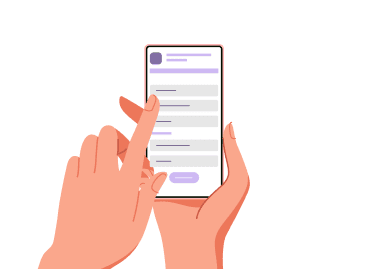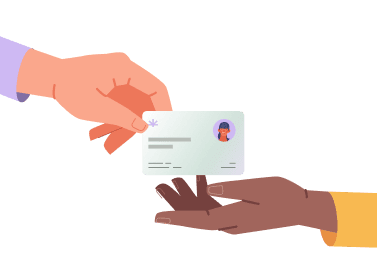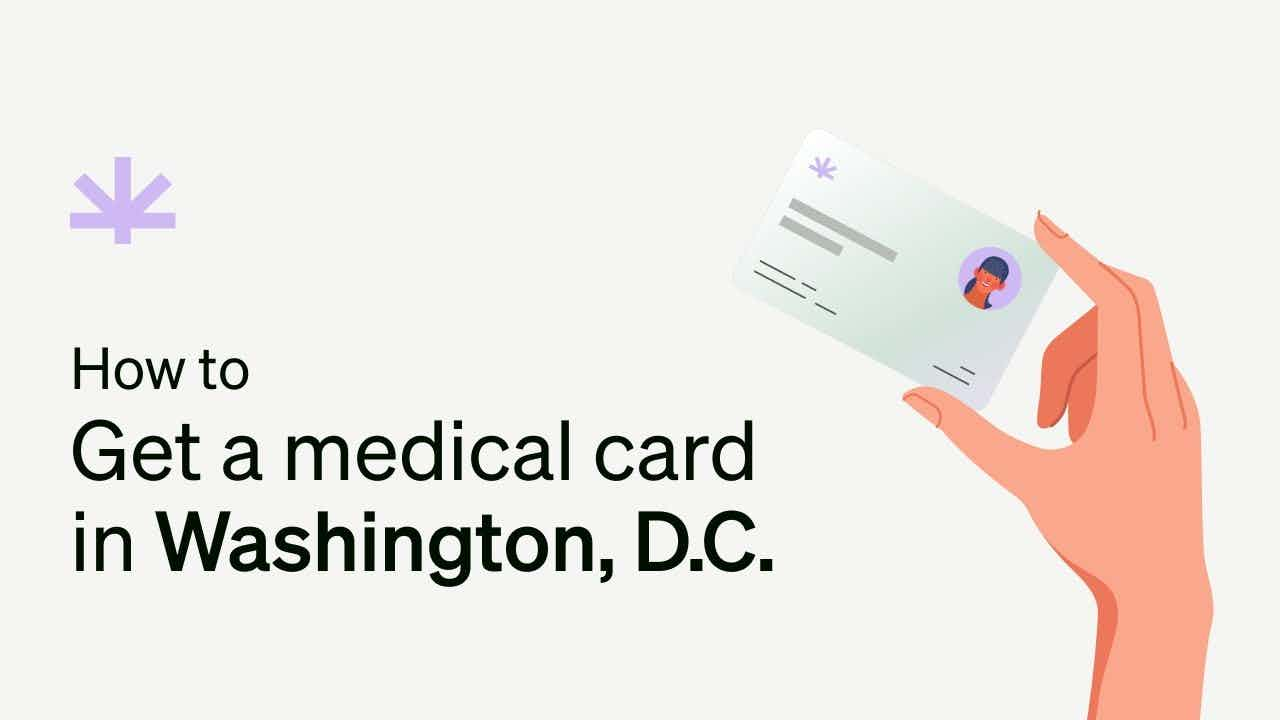Best Care, Best Value
Get Your Washington, D.C. Medical Marijuana Card.
Only $99.
Quick and Easy Process
Get Approved or Your Money Back
Already a Leafwell patient?
Log in here
Trusted by 400,000+ Patients
Best Care, Best Value
We are the #1 medical card certification platform with the best value in your state.
4.9 out of 5 stars
Patient support and satisfaction are at the heart of everything we do.
Be seen in under 10 mins
Our healthcare providers are available to see you from 8 a.m. to 8 p.m. 7 days a week.
Get approved in minutes.
It’s quick, easy, and convenient.
With medical marijuana legal, here's how a DC resident can easily apply for a medical card online.
- Step 1

Sign Up
Register with Leafwell on any device to speak with a healthcare provider about medical marijuana use.
- Step 2

Get Certified By Leafwell
This certificate is only required if you are under 21. It says your healthcare practitioner recommends you become a medical cannabis patient. If you’re a DC resident over 21, you may self-certify.
- Step 3

Complete the D.C. Application
Once certified, you need to register with the Alcoholic Beverage Regulation Administration. Complete the form in your Leafwell approval email, including adding the recommendation number on your certificate and the name of your physician.
- Step 4

Get Your Medical Cannabis Card
You’ll receive a digital and physical state medical card once your adult patient application is complete. Your card will be valid for two years from the date of issue.
Have Questions?
See a detailed step-by-step explainer on how to apply for legal medical marijuana use as a DC resident.
Benefits of Getting a D.C. Medical Marijuana Card
Wondering how the district’s medical cannabis programs can transform your experience?
State-Specific Steps
Embarking on your journey to relief in Washington, D.C., is simple. Let our caring specialists guide you through the state-specific steps if you're a D.C. resident interested in medical marijuana use.
- Sign Up With Leafwell
- Get Certified by a Doctor (Or Self-Certify)
- Complete the D.C. Application
- Receive Your Medical Card and Legally Shop at a Licensed Dispensary

Watch this video on how to get a medical card in Washington, D.C.
Best Care, Best Value
Retail price as of 04/16/2024
What You Pay with Leafwell
D.C. medical marijuana patients save more with Leafwell. Get your money back if not approved.
Qualifying Medical Conditions
There are no specific qualifying conditions to be eligible for medical cannabis patient registration in Washington, D.C., and your provider does not need past medical records. Instead, it is up to the certifying healthcare provider to decide whether medical cannabis is a good option.
Please note: People over 21 can self-certify with the Alcoholic Beverage Regulation Administration and do not need to see a physician to apply for a medical marijuana card.
Convenient, Quality Care When You Need It Most
With Leafwell, you'll be matched up with a highly knowledgeable, empathetic, licensed medical marijuana doctor or provider.

What You Need to Know
Apply NowEligibility / Patient
With medical marijuana legal in Washington, D.C., adults aged 18 and up are now eligible to apply for the district’s medical cannabis patient registration process.
New patients aged 18-20 must register for a consultation with a district-licensed healthcare provider and receive a written recommendation to qualify. That consultation can take place online via telemedicine.
Patients at least 21 years of age may self-certify their adult patient application (this means they do not need to meet with a doctor; they just need to complete the paperwork and submit it to the district).
Caregiver
Washington, D.C., defines a caregiver as a person designated by a qualifying medical cannabis patient to possess, obtain from a licensed dispensary, dispense, and assist in administering medical cannabis products. Caregivers must be 18 or older and may only serve one patient at a time. They may possess, administer, or dispense medical marijuana for their qualifying patient.
Can Minors Qualify?
Yes, but for an individual under 18 to participate in the District of Columbia’s medical marijuana program, a custodial parent or legal guardian must submit a Minor Medical Cannabis Patient Application on the minor patient’s behalf.
Minor patients need a healthcare recommendation number and an identified registered caregiver included in their application.
What You Need
You’ll need to provide the following to apply for a Washington, D.C. MMJ card:
Medical Marijuana Recommendation (Optional)
A healthcare provider’s recommendation with a date of issuance within two years of the application date is only required for patients under 21. Those 21 and older may self-certify on their medical card application.
Proof of Identity
You will need a 2″ x 2″ current face photo and a government-issued photo ID, such as a Washington, DC driver’s license, ID card, or U.S. passport. Out-of-state ID cards are accepted with two proofs of residency.
Proof of Washington, D.C., Residency
Acceptable proof of residence shows your current address, such as a copy of your D.C. DMV REAL ID with the included address matching the one used in your application, proof of payment of D.C. personal income tax for the tax period closest in time to the application date, a property deed for a D.C. residence showing the applicant as an owner or co-owner, or any other reasonable form of verification deemed by the Alcoholic Beverage Regulation Administration or the Alcohol Beverage Control Board or your designated agent to demonstrate proof of current residency.
Please note: Patients applying with a non-DC driver’s license or ID card must submit two proofs of residency with their application, whereas those applying with a valid D.C. ID only need to submit one.
Next Steps After Approval
Congratulations on getting your medical certification with Leafwell or for deciding to self-certify! You’re one step closer to legally buying medical cannabis from a licensed dispensary, but there are a few more steps to complete to get your Washington, D.C., medical marijuana card. Let’s dive in!
Before You Start: What You’ll Need
- A credit or debit card for registration fees
- A healthcare practitioner recommendation with a date of issuance within two years of the application submission date or self-certification for individuals 21 and older.
- A 2″ x 2″ current face photo
- Proof of identity
- Proof(s) of residency (two if applying with an out-of-state driver’s license or ID card)
Complete Application: Complete the cannabis administration application on the Alcoholic Beverage and Cannabis Administration website using the link from your email.
Pay the Fee: Pay the $100 in registration fees and submit the state application online.
Start Shopping: You will receive a digital approval letter and a physical card from the state in 10-14 business days.
How to Renew Your Card
Need to renew your Washington, D.C., medical marijuana card? For patients 21 and older, seeing a healthcare provider is entirely optional. Here’s everything you need to know:
Steps to Renew Your Card
- If you want to speak to a healthcare provider, sign in or register as a renewal patient here if you’re new to Leafwell.
- Speak to a district-licensed physician online via telemedicine (or decide to self-certify).
- Once approved, complete the patient renewal application following the prompts and upload your certificate from Leafwell (if applicable).
- Pay the $100 district fee and submit your application online.
- You will receive a digital approval letter and a physical card within 10-14 business days.
For more information about the med card renewal process or to begin the process today, check out our Washington, D.C. renewal page.
Legal Topics
Below, you’ll find a few need-to-know medical marijuana laws enforced in Washington, D.C.:
- Patients cannot consume cannabis in public places.
- Patients cannot drive or operate other motor vehicles under the influence of cannabis.
- Recreational cannabis sales are currently illegal.
- Cannabis cultivation is legal for anyone 21 or older, but individuals may not have more than three mature plants at a given time.
- In 2022, D.C. Mayor Muriel Bowser signed the medical marijuana self-certification emergency legislation into law. This emergency legislation enabled patients to self-certify for an adult patient application.
- In 2024, D.C. Mayor Muriel Bowser signed a bill declaring April 20th a tax holiday on medical cannabis sales.
- Medical records are not required as part of the Washington D.C. digital registration process for a medical marijuana certification.
Caregivers
Washington, D.C., defines a caregiver as a person designated by a qualifying medical cannabis patient as someone authorized to possess, obtain from a licensed dispensary, dispense, and assist in administering medical cannabis.
Caregivers must be 18 years or older, registered as the qualifying patient’s caregiver, and may only serve one patient at a time. Licensed dispensary or cultivation center workers who administer medical cannabis are not eligible to serve as caregivers.
Caregivers may purchase up to eight ounces of usable marijuana in a 30-day period.
To apply as a caregiver, you must submit a Medical Cannabis Caregiver Application, undergo a criminal background check, and pay the district a $100 nonrefundable application fee. Caregiver cards are valid for up to two years.
Reciprocity
Washington, D.C., allows patients with medical marijuana cards issued by any state to purchase medical cannabis from district-licensed dispensaries legally.
Non-D.C. residents, including international visitors, may register for temporary patient registration or use their valid patient registration from a U.S. state or territory that has been extended reciprocity.
The following states and territories recognize Washington, D.C., medical marijuana cards:
- Arizona
- Arkansas *
- Hawaii *
- Louisiana
- Maine
- Michigan (at the licensed dispensary’s discretion)
- Nevada
- New Hampshire
- New Jersey *
- New Mexico
- Oklahoma *
- Puerto Rico
- Rhode Island
- U.S. Virgin Islands *
- Utah * (up to two 21-day periods in a calendar year)
- Washington, D.C.
*Visitors must complete a visiting patient application process with the state program.
FAQs
Check out our Washington, D.C. FAQ page for more frequently asked questions in the district.
How much does a Washington DC medical marijuana certificate and card cost?
An online consultation for a Washington, D.C., medical marijuana card costs $99 and includes a 2-year certification. You’ll only be charged if approved. Plus, now you can sign up with a friend and save 10% on your consultation.
Those 21 and older may self-certify and do not need to meet with a provider.
Here’s an overview of the fees:
- $99 Initial certificate from Leafwell
- $99 Renewal certificate from Leafwell
- $100 State application fee* (currently waived)($25 reduced fee for Medicaid, DC Alliance, or proof of gross income for income verification)
*State fees are not included with Leafwell fees and are paid directly to the state.
What medical conditions qualify for a medical marijuana card in Washington DC?
There are no qualifying conditions in Washington, D.C. Instead, it is up to the certifying healthcare provider to have a conversation with their patient and decide if medical cannabis is the right option for the person.
People over 21 can self-certify and do not need to see a physician.
What do I need to know about applying for my medical cannabis card in Washington DC online?
Washington, D.C. residents who are 21 and older may self-certify instead of being certified by a healthcare provider. If you prefer speaking with a licensed healthcare provider for a Washington, D.C. medical marijuana card, the process is simple with Leafwell:
- Register with Leafwell and speak to a healthcare provider licensed in Washington, D.C., online. Consultations cost $99, and you’ll only be charged if approved.
- Complete the state patient application. If self-certifying, simply select “Self-Certification” under “Certification Type.” If entering a recommendation number, select “Recommendation”.
- Pay and submit any state application fees.
- You will receive a digital approval letter and a physical card from the state in 10-14 business days.
How old do I have to be to apply for a medical marijuana card in Washington DC?
You must be at least 18 years old to apply for a medical marijuana card in Washington, D.C. However, adults 21 and older can self-certify and do not need to see a healthcare provider.
Minor patients may apply with consent from a custodial parent or legal guardian.
Caregivers must be 18 years old or older.
Can I be/have a caregiver for a medical marijuana patient in Washington DC?
Yes, medical marijuana patients in Washington, DC, can have a caregiver. Caregivers will complete their application.
Caregiver Requirements:
- Must be 18 years of age or older.
- Registered as the qualifying patient’s caregiver.
- Caregivers can serve only one qualifying patient at a time.
- DC residents and non-residents are eligible to register as caregivers in the District’s medical cannabis program. Only DC residents may register as patients in the program. Caregiver applicants must be affiliated with a current patient to be approved.
- Only DC residents may register in the program as a patients.
- A criminal background check report must be submitted with the caregiver application (background check information can be found on the application).
- Individuals who administer medical cannabis at a retailer or cultivation center are not eligible.
Here’s how to apply as a caregiver:
- Individuals must submit a Medical Cannabis Caregiver Application with all required documentation and payment. Currently, an online application is not available for this application type.
- Mail or in-person: ABRA, Medical Cannabis Program, 2000 14th Street, Suite 102A, Washington, DC 20009
- Email: medicalcannabis@dc.gov
- Caregiver registrations are valid for two years from the date of issuance. An annual fee* applies. See the Fee and Renewal Schedule.
*The fee is waived through December 7, 2023.
State Resources:
How do I apply for the state program in Washington DC?
DC Residents aged 21 and over may self-certify their application instead of getting a healthcare provider recommendation.
Before you start your application, gather the following information and documents:
- Recommendation (expires 90 days after issuance)
- One current face photo, 2″ x 2″
- One copy of DC DMV REAL ID* OR
- One proof of DC residency and
- One copy of government-issued photo ID
- Caregiver Application (Optional)
- Reduced fee proof of income documentation (Optional)
Getting Your Washington, DC Medical Marijuana Card
These registration instructions are for DC residents only.
- Download your Leafwell recommendation. You will use the recommendation number on your certificate to apply. Keep it as a reference until you receive your medical card.
- Apply to the Medical Cannabis Program using the Adult Medical Cannabis Patient Application.
- Fill out all required information and upload relevant documents.
- Optional: If you have a caregiver, upload the Caregiver Application form to your application.
- Click the box to agree to the terms and conditions, type in your first and last name, then click Submit.
- Upon submission, you will be sent a confirmation of receipt email. If your application needs additional documentation, you will receive an email with the necessary documents requested.
- You will receive a second email detailing payment options within three (3) business days if your application is approved. (If you don’t receive an email, check your spam/junk folder.)
- To ensure prompt receipt, please add the state’s email address (ABCA.CannabisInfo@dc.gov) to your safe senders list, address book, or contact list.
- Receive a digital letter (valid for two years) within 14 business days. If you would like a physical card, there is an additional $10 fee.